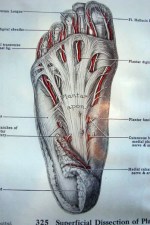
Plantar Fasciitis: Inflammation of the Plantar Aponeurosis
What ever you want to call this condition, caused by the way we walk and stand, it presents in mild, moderate, and severe forms. The most common or mild presentation is more of a nuisance, controlled with over the counter anti-inflammatory medication. A significant percentage of the cases become a real problem with intense pain not controlled by injections or powerful prescription medication. The most severe cases are treated surgically, by detaching the Plantar Aponeurosis form the Calcaneous.
Unfortunately, even more important than the condition itself, is that it represents a prelude to many other bio-mechanical conditions, in the foot, knee, and back, that are often much more difficult for your physicians to treat. If you fail to address the way you walk and stand, even if all of the pain is resolved, more disabling gait related problems will follow. The patient become frustrated a one chronic and disabling pain after another appears, all aggravated by walking and standing.
Plantar fasciitis can be mild, moderate, or severely disabling.
Mild cases are controlled simply by rest anti-inflammatory med., good shoes or over the counter insoles, and most of all a decrease in walking and standing.
Moderate cases require more more aggressive treatment to relieve symptoms. These patients experience pain for months or years, even when activity is minimized. Prescription or over the counter orthotics are frequently recommended and often used by the patient’s during all weight bearing activity. This type of treatment along with regular use of anti-inflammatory med. and occasional cortisone injections, and decreased ambulatory activity, will resolve a significant percentage of these cases.
Severe cases of this common and occasionally disabling medical condition do not respond to the above treatments and frequently go on to Surgery, where the Plantar Aponeurosis is detached from its attachment to the Calcaneous. Aggressive treatment with higher levels of angular correction (Theta) found only in Theta-Orthotics WILL control foot function and STOP the CHRONIC PAIN.
Theta can change the way you walk and stand and keep you active without surgery. 


